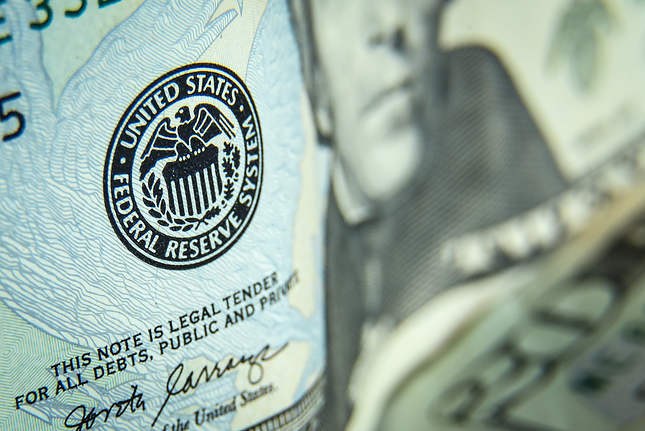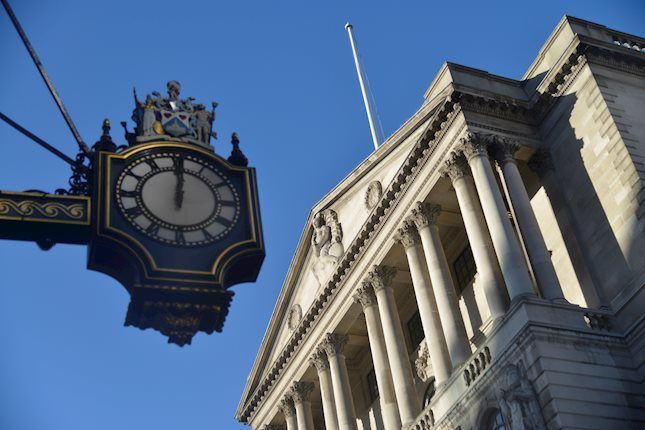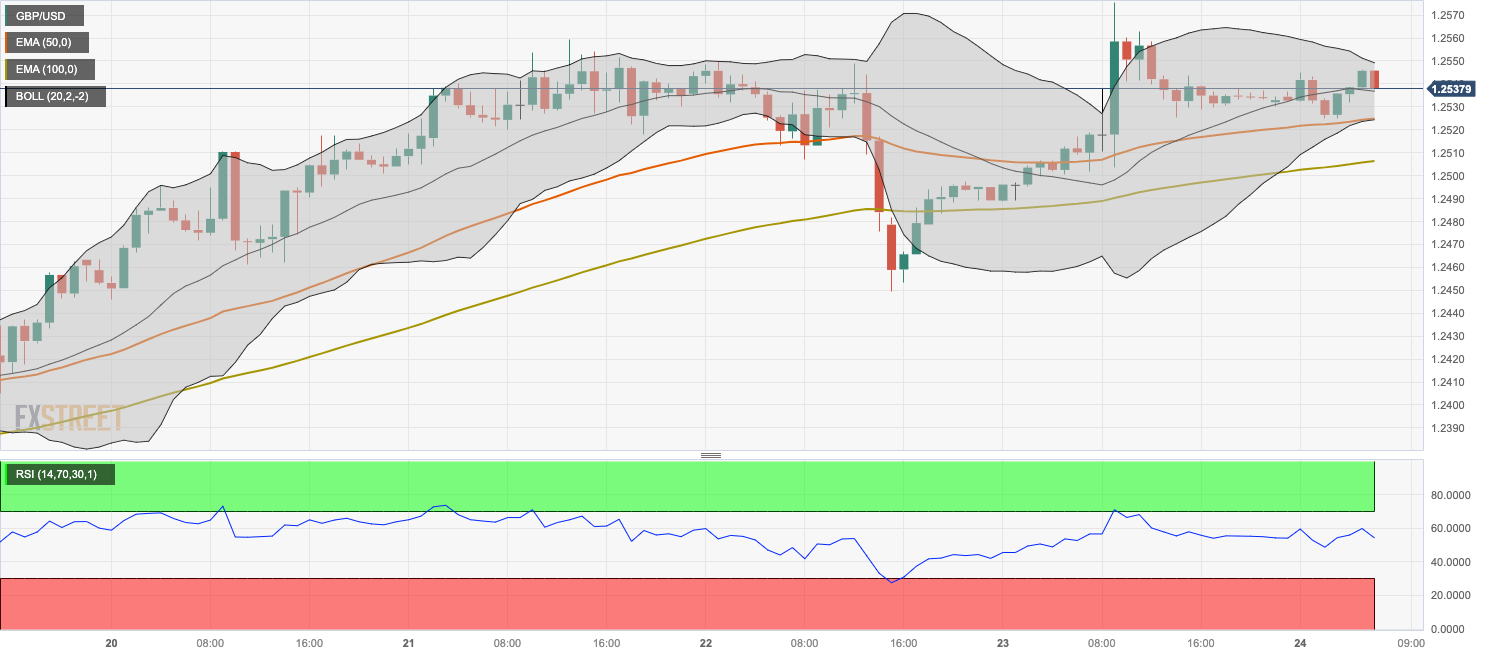- GBP/USD gains traction near 1.2540 ahead of the US PMI data.
- The pair holds above the 50- and 100-hour EMA; the RSI indicator stands in bullish territory above 50.
- 1.2550 will be the first resistance level; the critical support level will emerge at 1.2525.
The GBP/USD pair gains ground to a two-month high of 1.2575 and then pulled back to 1.2540 during the Asian trading hours on Friday. The uptick of the pair is supported by the stronger-than-expected UK S&P Global/CIPS PMI data for November. The attention will shift to the US S&P Global PMI data, due later on Friday.
On Thursday, the preliminary UK S&P Global/CIPS Composite PMI grew unexpectedly in November, coming in at 50.1 in November from 48.7 in October, better than expected of 48.7. Additionally, the Manufacturing PMI improved to 46.7 versus 44.8 prior, while the Services PMI rose to 50.5 from 49.5 previously. The British Pound (GBP) surged against the US Dollar (USD) as the Bank of England (BoE) Governor Andrew Bailey suggested interest rates could remain higher for longer than priced by investors.
According to the four-hour chart, GBP/USD holds above the 50- and 100-hour Exponential Moving Averages (EMAs), suggesting the path of least resistance is to the upside. The upper boundary of the Bollinger Band at 1.2550 will be the first resistance level for the pair. The next hurdle is seen near a high of November 23 at 1.2575. Further north, the upside target to watch is a high of September 4 at 1.2642, followed by a high of September 1 at 1.2713.
On the downside, the critical support level will emerge at 1.2525, portraying the confluence of the lower limit of the Bollinger Band and the 50-hour EMA. A break below the latter will pave the way to the 100-hour EMA and a psychological round mark at the 1.2500–1.2505 region. Any follow-through selling will see a drop to a high of November 16 at 1.2456 and finally at 1.2400 (round figure).
It’s worth noting that the Relative Strength Index (RSI) holds in the bullish territory above 50, indicating further upside looks favorable.
(This story was corrected on November 24 at 08:13 GMT to say, in the first paragraph, that the GBP/USD pair gained ground to a two-month high of 1.2575, not 1.2569.)
GBP/USD four-hour chart
Information on these pages contains forward-looking statements that involve risks and uncertainties. Markets and instruments profiled on this page are for informational purposes only and should not in any way come across as a recommendation to buy or sell in these assets. You should do your own thorough research before making any investment decisions. FXStreet does not in any way guarantee that this information is free from mistakes, errors, or material misstatements. It also does not guarantee that this information is of a timely nature. Investing in Open Markets involves a great deal of risk, including the loss of all or a portion of your investment, as well as emotional distress. All risks, losses and costs associated with investing, including total loss of principal, are your responsibility. The views and opinions expressed in this article are those of the authors and do not necessarily reflect the official policy or position of FXStreet nor its advertisers. The author will not be held responsible for information that is found at the end of links posted on this page.
If not otherwise explicitly mentioned in the body of the article, at the time of writing, the author has no position in any stock mentioned in this article and no business relationship with any company mentioned. The author has not received compensation for writing this article, other than from FXStreet.
FXStreet and the author do not provide personalized recommendations. The author makes no representations as to the accuracy, completeness, or suitability of this information. FXStreet and the author will not be liable for any errors, omissions or any losses, injuries or damages arising from this information and its display or use. Errors and omissions excepted.
The author and FXStreet are not registered investment advisors and nothing in this article is intended to be investment advice.
Recommended content
Editors’ Picks

AUD/USD appreciates as US Dollar remains subdued after a softer inflation report
The Australian Dollar steadies following two days of gains on Monday as the US Dollar remains subdued following the Personal Consumption Expenditures Price Index data from the United States released on Friday.

USD/JPY consolidates around 156.50 area; bullish bias remains
USD/JPY holds steady around the mid-156.00s at the start of a new week and for now, seems to have stalled a modest pullback from the 158.00 neighborhood, or over a five-month top touched on Friday. Doubts over when the BoJ could hike rates again and a positive risk tone undermine the safe-haven JPY.

Gold price bulls seem non-committed around $2,620 amid mixed cues
Gold price struggles to capitalize on last week's goodish bounce from a one-month low and oscillates in a range during the Asian session on Monday. Geopolitical risks and trade war fears support the safe-haven XAU/USD. Meanwhile, the Fed's hawkish shift acts as a tailwind for the elevated US bond yields and a bullish USD, capping the non-yielding yellow metal.

Week ahead: No festive cheer for the markets after hawkish Fed
US and Japanese data in focus as markets wind down for Christmas. Gold and stocks bruised by Fed, but can the US dollar extend its gains? Risk of volatility amid thin trading and Treasury auctions.

Bank of England stays on hold, but a dovish front is building
Bank of England rates were maintained at 4.75% today, in line with expectations. However, the 6-3 vote split sent a moderately dovish signal to markets, prompting some dovish repricing and a weaker pound. We remain more dovish than market pricing for 2025.

Best Forex Brokers with Low Spreads
VERIFIED Low spreads are crucial for reducing trading costs. Explore top Forex brokers offering competitive spreads and high leverage. Compare options for EUR/USD, GBP/USD, USD/JPY, and Gold.
